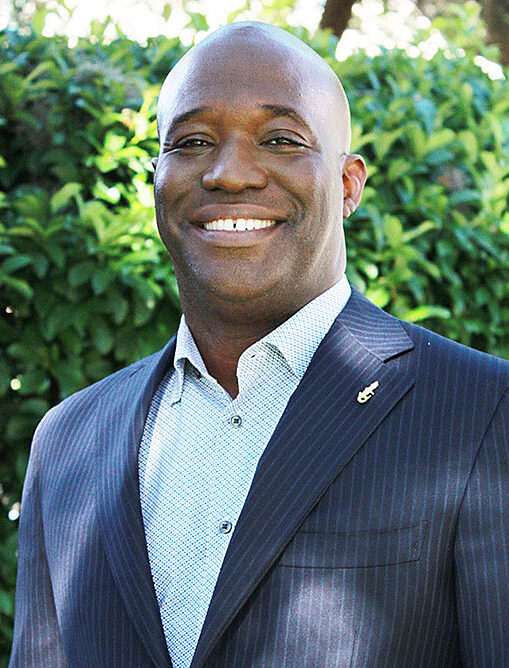Renowned brain tumor researcher to lead UF’s efforts to move research discoveries to patients

A leading expert in the search for ways to treat aggressive adult and pediatric brain tumors, Duane A. Mitchell, M.D., Ph.D., will direct the University of Florida’s efforts to speed research discoveries to improve health, as well as UF’s expanded Clinical and Translational Science Award partnership with Florida State University.
Mitchell was recently named director of the UF Clinical and Translational Science Institute, assistant vice president for research and associate dean for translational science and clinical research.
Mitchell has also been confirmed as the principal investigator of a $29 million Clinical and Translational Science Award to the UF CTSI and FSU, funded in July by the National Institutes of Health’s CTSA Program. Sponsored by the National Center for Advancing Translational Sciences, this nationwide network of more than 50 CTSA hubs develops, demonstrates and disseminates advances in translational science. Translational science is the process of turning research discoveries into treatments, approaches and cures that improve the health of individuals and the public.
“We look forward to seeing the achievements of the UF CTSI and the UF-FSU CTSA hub under Dr. Mitchell’s leadership,” said David R. Nelson, M.D., senior vice president for health affairs at UF and president of UF Health. Nelson had served as CTSI director and CTSA principal investigator since 2010. “We will continue our enthusiastic support of this vital catalyst of resources, people and ideas across UF’s 16 colleges, the state and the nation,” Nelson said.
Betsy Shenkman, Ph.D., remains co-director of the CTSI and co-principal investigator of the CTSA. Awards for the CTSA KL2 career development program for early-career faculty and CTSA TL1 training program for Ph.D. students are led, respectively, by principal investigators Thomas A. Pearson, M.D., M.P.H., Ph.D., and Wayne T. McCormack, Ph.D., both professors in the UF College of Medicine.
At FSU, the partnership is led by Jeffrey N. Joyce, Ph.D., senior associate dean for research and graduate programs at the College of Medicine.
“The next four years will be an exciting time for our partnership,” Joyce said. “We look forward to working with Dr. Mitchell to improve the health of our region and the state, particularly in our rural communities.”
Mitchell is co-director of the Preston A. Wells Jr. Center for Brain Tumor Therapy and co-leader of the Cancer Therapeutics and Host Response Program at the UF Health Cancer Center. He is the Phyllis Kottler Friedman Professor in the Lillian S. Wells Department of Neurosurgery and the State of Florida Endowed Cancer Research Chair at the UF College of Medicine.
“Dr. Mitchell has established a track record of accelerating research discoveries into treatments that can benefit patients with brain tumors,” said Joseph A. Tyndall, M.D., M.P.H., interim dean of the UF College of Medicine. “Applying this experience across the spectrum of health research at UF will be transformative for the institution and for the patients and community members who will ultimately benefit from these new treatments and approaches to health.”
Mitchell graduated from Rutgers University-New Brunswick with a bachelor’s degree in biology, and received his medical degree and doctorate in immunology from Duke University.
In 2013, Mitchell joined the UF faculty after more than a decade at Duke, and leads a comprehensive brain tumor program focused on translational research. He has considerable clinical and translational research experience, having successfully developed five FDA-approved investigational new drug applications for new brain tumor therapies discovered in his laboratory. He also directed seven first-in-human clinical trials exploring brain tumor immunotherapies in adults and children with incurable brain cancers.
Mitchell has received over $20 million in research grants to support his work, including funding from the National Cancer Institute, the National Institute of Neurologic Diseases and Stroke, and the Department of Defense. He holds numerous patents for novel cancer therapeutics and has received several honors and awards for his work. In 2016, Mitchell received a Top 10 Clinical Research Achievement Award from the Clinical Research Forum in Washington, D.C., in recognition of his team’s work in advancing a new cancer vaccine for patients with glioblastoma. Mitchell has a strong record of training M.D.-Ph.D. and Ph.D. students in the areas of immunology and brain tumor biology.
Mitchell’s expertise has been sought out internationally by academic, private and government institutions. He serves as an appointed member of the NCI Board of Scientific Counselors and as the gubernatorial appointee to the Florida Center for Brain Tumor Research Scientific Advisory Council.
“As a researcher, Dr. Mitchell has shown how visionary thinking, collaborative spirit and a focus on impact can help move UF forward,” said David P. Norton, Ph.D., vice president for research at UF. “Beyond elevating our institution, this is how we can build a better world.”
The UF-FSU hub is supported by the National Center for Advancing Translational Sciences of the National Institutes of Health under University of Florida Clinical and Translational Science Awards UL1TR001427, KL2TR001429 and TL1TR001428.